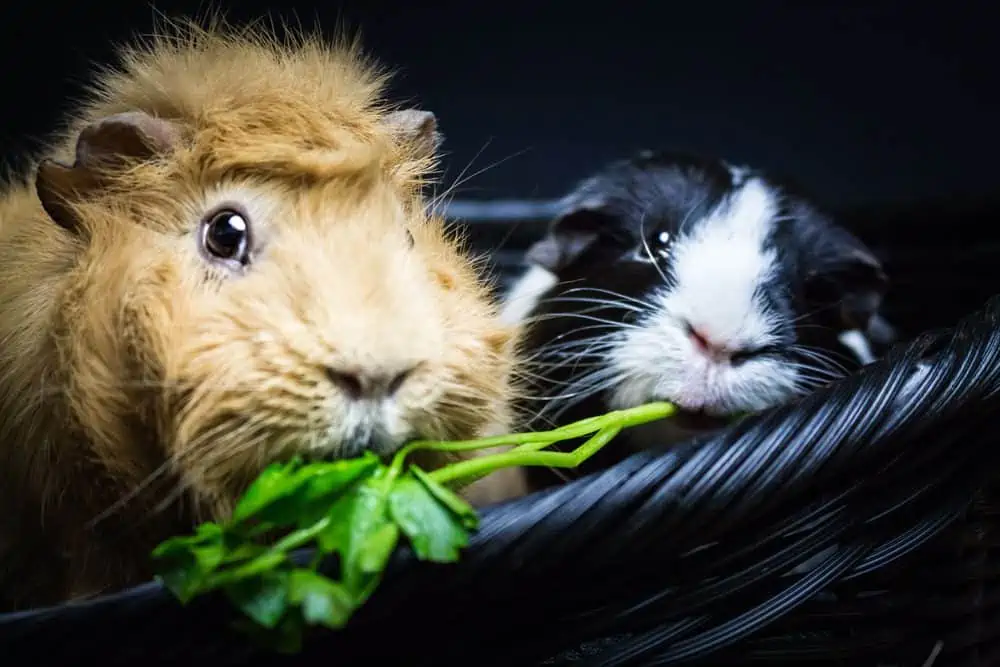
Gorgeous guinea pigs are susceptible to a number of skin complaints, which is why owners of these chatty cavies need to be vigilant and keep a close eye on their pets. Constant scratching is a warning sign and it’s vital to check for dry or flaky skin around ears, nose or mouth, spots or lesions, or fur coming out in clumps. These symptoms signal that an immediate trip to the vet is required.
Read more about the regular checks to carry out to keep your piggies in the best of health here
Skin issues – possible causes
- Guinea pigs can suffer from fleas and lice and are particularly susceptible to developing mite infestations. These irritating parasites can successfully be treated by your vet. It’s important to treat not only the affected guinea pig, but any others that they have come into contact with too. Their accommodation, tunnels, and toys will also need to be cleaned thoroughly and bedding replaced to prevent a further infestation.
- Some parasites live under the skin of guinea pigs, including ringworm, which is a fungal infection. Scabs are most commonly found around the head, face and ears but can spread across the back and legs. Your vet can prescribe a course of anti-fungal medication to get rid of the infection.
- Just like us, guinea pigs don’t have the ability to make their own Vitamin C and need a daily dose or they become vulnerable to scurvy. This nasty disease interferes with the body’s ability to manufacture collagen, which is important for bone and tissue formation, and can lead to problems in your guinea pig’s joints and skin. It’s entirely preventable by feeding high quality Guinea Pig Nuggets and a few Vitamin C-rich dandelion leaves or small bunch of parsley daily.
Sensitive skin
It’s thought that a key reason for skin problems is because, in the wild, guinea pigs live in a dry climate in the Andes region of South America. When kept as pets, their sensitive skin cannot always cope with the humidity they often experience. That’s why, to help your piggies stay healthy, good housekeeping and regular grooming are a must.
Good grooming tips
Grooming is a vital part of the routine care of guinea pigs. Long-haired varieties need daily grooming as their coats can quickly become matted and uncomfortable. Regular grooming is also a great way to bond with your small pets so they learn to relax and enjoy your gentle attention – and it gives you the opportunity to check their overall health and spot if something isn’t right.
Is your housekeeping on point?
Keeping your piggies’ accommodation dry is essential throughout the year. Damp and dirty bedding creates the ideal environment for bacteria, fungi and other harmful things to thrive in, which ups the chances of your pets developing a nasty skin condition.
- Remove and dispose of all soiled bedding (keep a small, unsoiled amount back to put in with fresh bedding so it still smells like home to reduce piggy stress) giving special attention to the corners of your pets’ enclosure.
- Use a guinea-pig friendly disinfectant to deep clean their accommodation at least twice a week.
- Always provide the right bedding. NEVER use wood shavings or sawdust as these not only absorbs the natural oils that guinea pigs have which they need to keep their coats and skin in good condition, they also create dust, which can lead to potentially fatal respiratory problems.
- The best bedding option is soft and fragrant meadow hay such as calmingExcel Feeding Hay with Chamomile (also good to munch on), with a thick layer of newspaper placed underneath, which you should change daily.
- Growing in popularity for small pets is vet bedding, which as well as being cosy, is non-allergic and washable, thereby helping to keep your pets’ environment hygienic. This specially designed bedding sucks moisture away so your guineas stay nice and dry, particularly if you place a thick layer of newspaper under it and change it regularly.
Paying particular attention to your guinea pigs’ environment and feeding them the right food will help keep their skin in tip-top condition. Happy piggies!
If you found this interesting, you may also like:
OUR 7-POINT GUIDE TO BEING A GOLD-STAR GUINEA PIG OWNER
Guinea pigs have been popular pets for generations. Today, we are better informed about how to care for these friendly little creatures, so that we can provide them with everything they need to enjoy happy and fulfilling lives
TAKE A CLOSER LOOK AT YOUR PETS' DIET – GUINEA PIGS
Wild guinea pigs naturally eat a diet of grasses, plants, vegetables and crops. As exotic pets, piggies require a specialist diet to meet all their nutritional requirements. Our in-house vet Dr Suzanne Moyes is on hand with expert advice
HAVE YOUR GUINEA PIGS HAD THEIR VITAMINS TODAY?
Just like us, guinea pigs need their daily dose of vitamin C to stay healthy. Are your piggies getting the right amount?
12 FACTS ABOUT GORGEOUS GUINEA PIGS
When it comes to guinea pigs, what’s not to love? But how much do you know about these highly social, scent-marking, mid-air spinning small furries?
BONDING WITH YOUR SMALL PETS
Hand feeding is a great way to build a closer bond with small animals. It takes time to build trust, but when your little friend finally feels confident enough to take a treat from your hand, it’s a special moment. Our in-house vet Dr Suzanne Moyes has some tips...
Sources: pets4homes.co.uk, netvet.co.uk, bluecross.org














